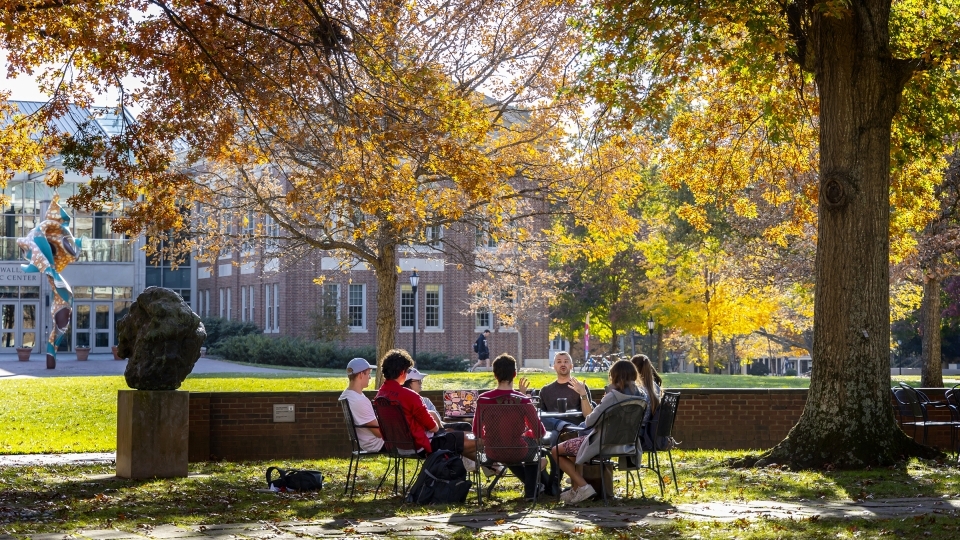‘Clear, Concise and Timeless’: Davidson’s Commitments to Free Expression
December 1, 2021
- Contact
- Jay Pfeifer

Freedom of Expression Forum
On February 16, 2022, members of the Davidson College community discussed the proposed Commitment to Freedom of Expression.
Watch the recorded webinar.
Published December 1, 2021:
A group of students, faculty and alumni have drafted a statement affirming Davidson’s commitment to free speech and inquiry. Led by Issac Bailey ’95, the Visiting Batten Professor of Communication Studies, the document is the work of a group who reflect the diversity of Davidson and who relied on the trust and respect through which our community is sustained.
Bailey and Political Science Professor Susan Roberts worked with:
- Beadsie Woo, a member of the Board of Trustees who graduated in 1986 and was the first woman and person of color to serve as SGA president.
- Former North Carolina Governor James G. Martin ’56, who is a member of the Davidsonians for Freedom of Thought and Discourse.
- Jared Herr, a Film and Media Studies major from the class of 2022 and a member of the Wildcats swim team
- Varun Maheshwari, also from the class of 2023 and a Political Science and Hispanic Studies double major.
The group began its work in late October at the request of President Carol Quillen. Trading drafts and revisions over email, a single version began to emerge just a couple of weeks later and Bailey convened the group in a Chambers Building classroom on a Sunday afternoon in November for final edits.
Lit by the projector, they worked through the draft line by line, voting on changes when agreement did not come quickly.
“It’s important to understand that the folks in that room didn’t share a political philosophy or ideology or even what it means to be civil in a heated debate,” Bailey said. “But we shared a commitment to free speech, not just by the letter of the First Amendment, but its spirit as well.”
Three hours after they started, they emerged with a draft of Davidson’s Commitment to Free Expression.
“By the time we finished, there was a unanimous consensus,” Gov. Martin said. “Our goal was to produce a document that would be clear, concise and timeless.”
The document, which weighs in at fewer than 800 words, aims to affirm free expression in a way that is unique to Davidson.
“I was delighted to discover the magic of bringing together people who are committed to the institution and to free speech,” said Woo. “Through a lot of collective thinking, we arrived at a statement that is aligned with both the Chicago and Princeton statements in intent, but contextualized for Davidson.”
The well-known “Chicago Principles,” a 2014 statement by the University of Chicago of its commitment to free expression and debate, did not necessarily apply to the challenges of speech at Davidson. They and the similar Princeton statement address the threat of the institution shutting down debate and discussion—which is expressly forbidden in the College Constitution.
Instead, at Davidson, students and faculty talk about self-censorship. They describe an environment in which they sometimes are not comfortable speaking up.
The new document aims to enable expression on campus, to build a culture where everyone can participate and be heard.
Davidson’s Commitment to Free Expression is grounded in honesty about the college’s past—freedom of expression can’t exist when some people are barred from the conversation—as well as in the unique sense of community that animates life at Davidson.
“This document does not say what you can and can't do,” said Maheshwari. “This is designed to help us find common ground so we can listen to one another. Nowadays, we can be so focused on what makes us different, but at Davidson we are such a close-knit community.
“If we can't find commonality in a place like Davidson,” he asked. “How do you expect to find commonality outside of Davidson?”
All members of the Davidson community will have the opportunity to react to this commitment. Sign up for conversations during the spring semester regarding the ongoing efforts around freedom of expression on the Davidson campus and to offer suggested questions for those discussions.



